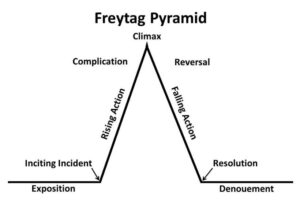 As you can tell, I’m on a business storytelling binge lately. Here’s the next useful idea for you.
As you can tell, I’m on a business storytelling binge lately. Here’s the next useful idea for you.
Bless the people who do research and then share what they discover, so we can use it in a practical way!
This week’s shout-out goes to Gustav Freytag, a German poet and playwright from the 1800s. To improve his success, he analyzed countless plays – from the Greeks through Shakespeare – to determine what made their dramas so successful. Freytag came up with the idea that a story unfolds in five acts, which is now known as the Freytag Pyramid.
As business storytellers, we can learn a few things from this.
Running Around a Triangle
Exposition introduces our listeners to important information about our characters – often the protagonist (hero) and antagonist (opponent – a person, group or situation), settings and events. Before you start yawning, know there are some interesting ways to share this in addition to plain narrative: through flashbacks, the characters’ thoughts, and providing details about people/places/things.
Rising action is the series of events that drive the story. They begin with an incident that sets everything into motion, and continue through the complications that arise as actions (or inactions) reverberate and cause reactions (intended and unintended). This is important: because the plot, climax and satisfactory conclusion depend on our believing these events.
The climax is the turning point. This determines the fate of our heroine or hero, which reverses her or his situation. Let’s look at the two ends of the continuum for stories. In a tragedy, the situation goes from good to bad, often revealing the heroine’s flaws or weaknesses. In a comedy, events that were going against the hero now unfold in his favor, often through luck or inner strength.
In the falling action, the conflict between the hero/heroine and the opponent plays out. This can include some suspense, when we’re not sure how the situation will be resolved.
The denouement – which usually is a resolution, a revelation or a catastrophe – is the final scene. Conflicts end, releasing tension and anxiety for the listener.
This is the difference between a story and a joke or anecdote: it has these five acts (the jargon for this is story arc).
Be Mindful
This week, pay attention to the stories you see and hear (the holidays should bring some doozies). Where do you see these stages play out in them? What worked well and what fell flat?
Then look at your own stories, to see how well you’ve developed each part of them. What do you need to shore up, and where have they dragged on too much? (All you need to do is watch your listeners’ faces …)
This bit of focus can lead to people asking to hear your stories – and sticking with you throughout them!
